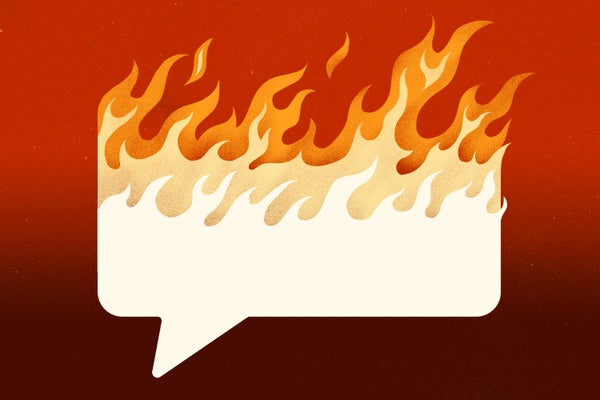Google, X and Facebook Are Modern-Day Tobacco Companies
Just as tobacco companies knew they were poisoning people, today’s social media titans knowingly poison our politics, peddling lies and stoking angry divides for profit

From Facebook to X to TikTok, today’s social media giants position themselves as bastions of free speech. Meta CEO Mark Zuckerberg now says fact-checking caused “too much censorship,” while TikTok brandishes a freedom-of-expression argument against its forced sale. Who, after all, could argue against the untrammeled freedom to speak?
The answer, it transpires, might be anyone paying attention. As we begin to understand the cataclysmic effect of viral misinformation flooding social media, the undeniable reality is that these media empires profiteer hugely from division and fear. In everything from politics to health, falsehoods propagated across social media cause immense harm. From 2018’s genocide against Myanmar’s Rohingya people, incited on Facebook, to X, Facebook and Telegram posts last year that sparked violent anti-immigrant riots in the U.K. to the people who gave 1.8 million views to a TikTok video that encouraged them to take bleach enemas to cure supposed parasite infestation, the evidence is clear that social media myths cause huge societal harm.
While Europe has moved to hold social media giants accountable, U.S. efforts have almost completely faltered, with YouTube, X and other platforms curtailing misinformation teams and allowing conspiracy theories to run riot. The industry’s now familiar attempts to deny responsibility for the harms of immensely lucrative products follows a familiar, deeply instructive playbook: the tobacco industry’s strategy of obstruction.
On supporting science journalism
If you’re enjoying this article, consider supporting our award-winning journalism by subscribing. By purchasing a subscription you are helping to ensure the future of impactful stories about the discoveries and ideas shaping our world today.
Just as four in 10 people were once smokers in the U.S., poisoning their lungs, vast numbers of people now get their news through the editorial prism of social media, poisoning their perceptions.
Around a fifth of Americans now get their news from social media influencers. A recent European survey of older teenagers and young adults found that 42 percent got their news mainly from social media platforms such as TikTok and Instagram. In the past two decades, social media giants have displaced traditional media as the news source for many, without the pesky issues of journalistic integrity or editorial responsibility. Instead they profit off engagement. And it is here that the corporate avarice and mendacity of the tobacco industry are especially illuminating.
Long before the overwhelming harms of smoking were widely known, tobacco companies already knew their product was harmful and addictive. Instead of taking corrective action, they spent decades undermining any regulation, even while cigarettes continued to kill millions. Opting not to mitigate harms but to instead distract from the overwhelming evidence their product was deadly, they aggressively pushed their product on vulnerable audiences. One now infamous leaked memo from a tobacco company in the 1960s bragged that “doubt is our product,” a means to distract from the harms of their profitable industry.
In the information age, social media companies are no different. From their own internal metrics, tech giants have long known what independent research now continuously validates: that the content that is most likely to go viral is that which induces strong feelings such as outrage and disgust, regardless of its underlying veracity. Moreover, they also know that such content is heavily engaged with and most profitable. Far from acting against false, harmful content, they placed profits above its staggering—and damaging—social impact to implicitly encourage it while downplaying the massive costs.
We’ve known this at least since the aftermath of the divisive 2016 American presidential election, where the culpability of social media for its signature triumph of fictions was greeted with what now looks like mock contrition. Tech giants such as Facebook even trumpeted their partnerships with fact-checking organizations.
This now rings insultingly hollow— in 2021 Facebook whistleblower Frances Haugen revealed that the company, soon renamed Meta, did in fact have the tools to effectively halt the spread of dangerous disinformation on everything from politics to medicine. Yet its leaders chose to hobble those tools, precisely because they made more money off the high engagement that inflammatory fictions brought. (Asked about this criticism, a Meta spokesperson referred to an announcement made by Zuckerberg in January and the company’s policies on misinformation and “inauthentic behavior.”)
Social media titans embrace essentially the same hypocrisy the tobacco industry embodied when they feigned concern over harm reduction while covertly pushing their product ever more aggressively. With the reelection of Trump, our tech giants now no longer even pretend to care. They are pivoting instead to superficial celebrations of free speech. This was the rationale Zuckerberg adopted in when he said that Meta would cease fact-checking in his January announcement. Elon Musk meanwhile has labeled himself a “free-speech absolutist.” But between Zuckerberg’s Meta throwing a legal arsenal into silencing former Facebook executive Sarah Wynn-Williams’s damning insider account and Musk’s attempts to silence critics on X, as well as opposition protests in Türkiye, the hypocrisy is inescapable.
Platitudes about free expression betray a deliberate ignorance of human psychology. We tend to emote first and reason later, an observation that won psychologist Daniel Kahneman an economics Nobel in 2002. To take but one example, the riots that convulsed swatches of England and Northern Ireland last year were fueled by social media accounts claiming sickening crimes by immigrants, amplified by right-wing accounts. That these accounts were fictitious was no impediment to their ability to arouse fear and anger.
We have known for more than a decade that the ability to induces anger or disgust is a strong predictor of social media virality. This comes at a cost of veracity, as correctives to explosive fictions garner only fraction of the engagement. Even more concerning is the phenomenon of illusory truth, where repeated exposures to a falsehood prime us to accept it, even when we know it to be false on an intellectual level. For disinformation to do harm, it doesn’t even have to convince, it simply must induce doubt enough to render us unsure so that we sleepwalk into apathy. This underpins the extraordinary power of antivaccine propaganda, the major driver of vaccine hesitancy, where fear and doubt, induced by propaganda, can prompt concerned parents to delay or even refuse vaccination. Resistance to allowing vaccination has killed at least one child in Texas’s measles outbreak this year..
Social media companies know this. Engagement is their business model, and doubt about the harms they cause is their product. Tobacco executives, and their bought-off scientists, once proclaimed uncertainty over links between cigarettes and lung cancer. Zuckerberg has likewise testified to Congress, “The existing body of scientific work has not shown a causal link between using social media and young people having worse mental health, ” even while studies find self-harm, eating disorder and misogynistic material spreads on these platform unimpeded. This equivocation echoes protestations of tobacco companies that there was no causal evidence of smoking harms, even as incontrovertible evidence to the contrary rapidly amassed.
For all this, social media companies deserve opprobrium and ultimately regulation. Despite their protestations, they are not advocating free speech, only freedom from consequences for themselves. Until we start to think about how to mitigate the damage they wrack and begin placing societal trust over social media profits, tech billionaires will continue to exploit human misery and stoke our divisions to line their purses.
This is an opinion and analysis article, and the views expressed by the author or authors are not necessarily those of Scientific American.










